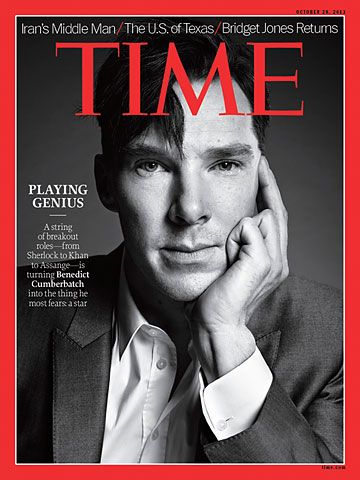
(2 of 4)
As Smaug in Peter Jackson's forthcoming Hobbit films, Cumberbatch's body will be absent completely, replaced by cutting-edge CGI. "I've got to be a however-many-hundreds-of-years-old, fire-breathing, dwelling-under-a-mountain creature of destruction and doom. That can fly. And that is about the size of the Empire State Building," he says with amazement. Tolkien's work was a formative influence on him. "Growing up," he says, "my dad read it to me, and it was a real treat, a feast for a child's imagination. He did an amazing Smaug and hobbits and Gandalf as well — it's the audiobook that will never exist. If I was good that night, I'd get to hear two chapters."
There's a touch of playfulness in Cumberbatch's dashing Peter Guillam, in 2011's Tinker Tailor Soldier Spy. With his handsome suits and leonine highlights, Guillam was all youth and flash in the drab world of Cold War espionage. But Guillam's glamour was "a hollow symbol," Cumberbatch says. "He's covering up the fact that he's a gay man in a very heterosexual world, and he has to compromise any idea of domestic security to protect his own back." Cumberbatch fast-forwards to his newest character. "I guess," he says, "Julian ended up doing the same thing. He's literally living in a converted bathroom next to an embassy behind Harrods. I don't know what will happen if more revelations come out that finger him or somehow embroil him in something where he can't exist as a refugee any longer."
LAW AND ORDER
In 1976, London was a city roiled by Irish Republican Army bombings, major trade-union strikes, punks hawking up their first rebellious emissions and a long, hot summer. That July, Cumberbatch was born to two actor parents, Timothy Carlton and Wanda Ventham. (His father had dropped the mouthful of a surname.) "As actors, they had this peripatetic, slightly out-of-control lifestyle, uncertain of future careers," he recalls. He has a half-sister from his mother's previous marriage: "She's adorable. She kind of babysat me when I was growing up."
His parents were set on his finding a different livelihood. "They afforded my education by taking every job that was coming — an education for getting me opportunities to do anything but be an actor," he says. He first considered becoming a barrister. "It was very romantic, the notion of setting up in court like Rumpole of the Bailey." The closer he got to donning the wig and robes, though, the more ambivalent he became. Life as a lawyer was hardly secure. "The reality was being equally oversubscribed, equally as good as your last job, equally as unrewarding and hardworking and peripatetic." He "kissed that life goodbye," he says, at 17. He spent England's traditional gap year before university teaching English in a Tibetan monastery, then studied drama at the University of Manchester before earning an M.A. at the prestigious London Academy of Music and Dramatic Art (alma mater to Jim Broadbent and Chris O'Dowd, among others).
He landed roles in BBC miniseries and on London stages; by 2005 he'd earned a Laurence Olivier Award nomination for Best Supporting Actor as the emotionally stunted academic Jorgen Tesman in Ibsen's Hedda Gabler. Cumberbatch won the Olivier seven years later for playing both Frankenstein and his monster in Danny Boyle's 2011 production for the Royal National Theatre. His father was starring in a revival of Cause Célèbre at the nearby Old Vic that season. "[My father and I] would sort of meet at bars on the South Bank afterwards," Cumberbatch recalls. "I love the fact that I make [my parents] proud. And because they're actors, they get it, which is wonderful."
When Sherlock came along in 2010, his mother understood the strange balance of respect and irreverence it takes to keep a television icon fresh: she'd spent 20 years as various characters on the BBC's legendary Doctor Who.
"I knew I was in very safe hands with the creators, Mark Gatiss and Steven Moffat," Cumberbatch says. Their update of Sir Arthur Conan Doyle's detective series — which replaces Victorian Gothicism with millennial dread, Holmes' icy yet almost demure decadence with a quasi-autistic, nicotine-addled quirk and Watson's gentlemanly idolatry with a mutually acknowledged, winking, anxious homoeroticism — won a devoted following on both sides of the Atlantic and earned Cumberbatch an Emmy nomination in 2012. The show returns for a third season this winter.
